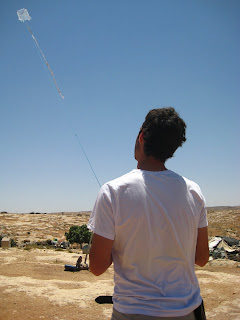 Tamaam in her tent after the attack
Tamaam in her tent after the attack is a small community consisting of about 20 families. Traditionally, the people of Susiya have been cave dwellers, but since the Israeli army demolished their caves and expelled them from their original site, they have been living in tents. Situated right next to their current location is an Israeli settlement, also called Susiya. The settlers living here are driven by religious and ideological motives, making them a constant threat to the surrounding communities. This settlement and all the other settlements in the West Bank are considered illegal under international law.
It's Sunday afternoon in Susiya. Imran and his wife Rabiha are out grazing their sheep together with Imran's aunt Tamaam and her husband Khalil. They move a couple of hundred meters away from the tents that make up their little community, around a bend and out of sight to the others. Suddenly, six masked young men with wooden bats and clubs come storming up towards them.
It is over quite quickly. 57-year old Tamaam is lying unconscious on the ground after having been hit and kicked in the head, face and torso. Her right arm and jawbone is broken. Khalil is bleeding from the head. Imran and Rabiha are badly bruised after several heavy blows.
This incident is not uncommon in the South Hebron Hills. Settler attacks occur weekly. It is the settlers' attempt to drive the Palestinians out of the area. Our EAPPI team met Tamaam and Imran a few days after the attack in their tents. They told us what had happened: Two settlers had come up to them before the attack and told them to leave within ten minutes. They refused. After all, the land belongs to the family. The price of resistance – broken bones.

What is uncommon is that it was
filmed by a family member and published worldwide. Since January 2007, the Israeli human rights organisation,
B'Tselem, has distributed 100 cameras to families in Palestine, of which 30 are given out in the Hebron area. The so-called
'Shooting Back' project aims to expose human rights violations and to give Palestinians in particularly vulnerable circumstances an opportunity to document violence and humiliation.
Whether this video material will lead to any kind of prosecution of the attackers is uncertain. Another Israeli human rights organisation,
Yesh Din, has documented that such attacks are increasing and happening on almost a daily basis. In 2005, 90 percent of the 299 complaints were closed, whilst another 5 percent were lost and never investigated. The same year, Israeli organisations received 599 complaints. I have personally witnessed several incidents that have never been reported.
I see the unrest and fear that this kind of life instigates in the children living close to settlements. They jump at sounds, hide behind their parents when strangers arrive (quite unlike other Palestinian children), and they have nightmares. Such invisible wounds might be more difficult to heal than the physical ones that Imran, Rabiha, Khalil and Tamaam suffered.
The EAPPI Hebron team provides protective presence in Susiya and other communites in the South Hebron Hills. We stay with families overnight, especially around Shabbat (Saturdays) and on Jewish holidays, when the settlers tend to be most active.
 Getting sunburnt in Haifa
Getting sunburnt in Haifa  Jean-Marie - film noir cool
Jean-Marie - film noir cool
















